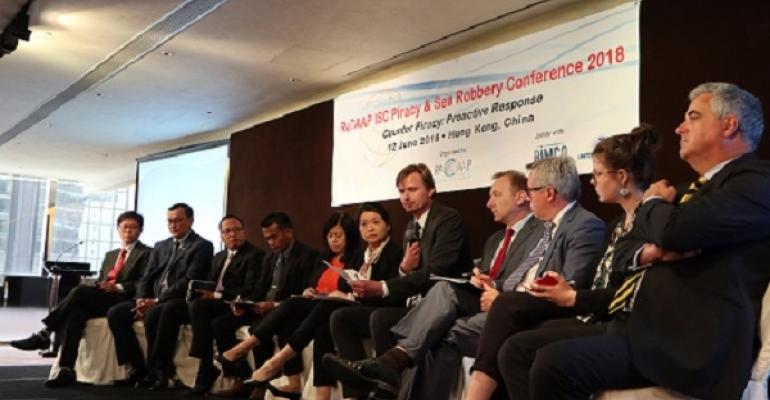With the theme “Counter Piracy: Proactive response”, ReCAAP ISC along with co-organisers Bimco and Intertanko, supported by the Hong Kong Shipowners Association, sought to underscore the importance of staying vigilant and not taking for granted the success that Asia had achieved in reducing the number of piracy and sea robbery incidents over the past decade.
Representatives from the Philippine Coast Guard (PCG), the Malaysian Maritime Enforcement Agency (MMEA), Indonesia’s BAKAMLA, EU NAVFOR (Horn of Africa), MDAT-GoG (Gulf of Guinea), ReCAAP ISC, and the shipping industry gave a round-up of the current situation in Asia and other regions including the Horn of Africa and Gulf of Guinea.
A common theme that emerged was the need for greater trust and more timely sharing of information. ReCAAP ISC assistant director for research Lee Yin Mui pointed to the IMO MSC Circular 1334 which encourages reporting of incidents to coastal states.
MMEA senior assistant director Maritime Intelligence Department Zainuddin Mohd Zuki and BAKAMLA section head for Multi-lateral and International Organisation Cooperation Hudiansyah Nursal meanwhile emphasised the importance of timely reporting to help the agencies do their work more effectively.
PCG assistant deputy chief of Coast Guard Staff for Intelligence, Security and Law Enforcement Al-Hafidz Bih acknowledged that trust is a gap between industry and law enforcement agencies and noted that PCG continues to conduct regular consultative meetings to build up trust.
However some successes were also noted. ReCAAP ISC reported that there were no incidents of piracy or abduction of crew in the Sulu-Celebes Seas and no hijacking of ships for oil cargo theft in the year-to-date. These were respectively the most common incident reports in the past few years.
“This year’s ReCAAP ISC Piracy and Sea Robbery Conference addresses developing situations in the Sulu-Celebes Seas, the Horn of Africa and the Gulf of Guinea, as well as pertinent topics such as oil cargo theft and the situation of armed robbery against ships in Indonesia. In bringing the Conference to Hong Kong, we hope to engage the shipping community in China and foster a dialogue between the shipping industry and regional authorities, for the welfare of seafarers and the safety of sea lanes,” said ReCAAP ISC ed Masafumi Kuroki.
Read More: IMB calls for global information sharing centre to combat piracy, illegal migration
The need for greater cooperation was also noted by other key participants.
“Piracy and armed robbery at sea remains a major concern to our seafarers and therefore the shipping industry. In order to keep up with the ever-developing threat, we need to continuously improve our cooperation, processes and procedures. The key to our success includes that anti-piracy lessons learnt from across the globe are shared,” said BIMCO head of security Jakob Paaske Larsen.
“Piracy and armed robbery around the globe takes many forms and is proving very hard to eradicate. By looking at what works we can see that the Asian model of a coordinated response, backed by proper intelligence, provides a good template for how to deal with this scourge. Those hard won lessons are now being applied to the new threats that the shipping industry is facing off Yemen,” said Intertanko marine director Phillip Belcher.
Copyright © 2024. All rights reserved. Seatrade, a trading name of Informa Markets (UK) Limited. Add Seatrade Maritime News to your Google News feed.


